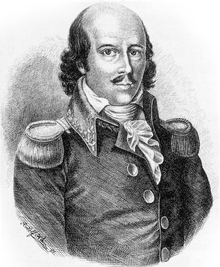Rudolf Eickemeyer
| Rudolph Eickemeyer | |
|---|---|
 |
|
| Born |
11 March 1753 Mainz, Electorate of Mainz |
| Died |
9 September 1825 (aged 72) Gau-Algesheim, Mainz-Bingen |
| Allegiance |
|
| Service/branch | French Army |
| Years of service | 1791–1799 |
| Battles/wars | French Revolutionary Wars |
| Other work | Bürgermeister (mayor), Gau-Algesheim Chamber of Deputies, Grand Duchy of Hesse |
For the photographer see Rudolf Eickemeyer (photographer)
Jean Marie Rodolphe Eickemeyer, also called Heinrich Maria Johann Rudolf Eickemeyer, was an engineer, mathematician, and general of the French Revolutionary Wars. He was born on 11 March 1753 in Mainz, and died 9 September 1825 in Gau-Algesheim, a town in the Mainz-Bingen district of present-day Rhineland Palatinate.
Originally in the service of the Elector of Mainz, after the fall of Mainz in 1792, he served in the French Republican Army, attaining the rank of general of brigade, and commanded a division at the Siege of Kehl (1796). He left French service in 1799 and retired to Mainz, but found no employment there. He moved to his hometown, where he served two terms as mayor, and was elected as a deputy to the Chamber of the Grand Duchy of Hesse.
Eickemeyer's father came from Eichsfeld, and had studied mathematics in Göttingen and then at the ducal college in Mainz, and led him through his earliest studies, giving him a solid grounding in the sciences. In 1770, he entered the school of Artillery in the position of an officer. Before taking a position of professor of mathematics at the University, he went at the end of January 1775 to Paris, to study for a half year, and then visited the Netherlands and England. In particular, he study the workings of water and its relationship to military architecture. After his return to Mainz, he began to lecture, but was also in the military service and civil administration, gradually acquiring more responsibility and authority as he became a lieutenant colonel and director of hydraulics.
By 1779, he was the chief engineering officer and had responsibility for the reinforcement and expansion of the Mainz fortifications, which were sadly depleted. However, the Elector of Mainz were adamantly against the investment in the strengthening of the Mainz fortifications, and not until after the outbreak of the French Revolution was there any interest in military affairs. The 1790 campaign against the insurgents of Liege was made; Eickemeyer also commanded the Elector's army, but by then it required so little of his time that he was able to resolve an engineering problem for the Munich Academy.
...
Wikipedia
